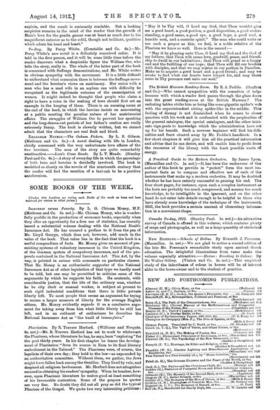Pharisaism. By E. Travers Herford. (Williams and Norgate.
net.)—Mr. B. Travers Herford has set to work to whitewash the Pharisees, whose literature he has he says, been "exploring" for the past thirty years. In his first chapter he traces the develop- ment of Pharisaism "from its source in Ezra to its final literary embodiment in the Talmud." The Pharisees were, of course, the legalists of their own day; they held to the law—as expounded by an authoritative committee. Without them, we gather, the Jews might have fallen back among the Gentiles. They lived by rule, and despised all religious lawlessness. Mr. Herford does not altogether succeed in obtaining his readers' sympathy. When he touches, how- ever, upon Pharisaic literature he makes good at least something of his favourable contention. Some of the prayers he quotes are very fine. No doubt they did not all pray as did the typical Pharisee of the Gospel. We quote two very interesting petitions
"May it be Thy will, 0 Lord my God, that Thou wouldst give me a good heart, a good portion, a good disposition, a good under- standing, a good name, a good eye, a good hope, a good soul, a humble soul, and a contrite spirit." The man who could write or use such a prayer as this, we feel, is a noble relative of the Pharisee we know so welL Here is the second :--
"May it be pleasing unto Thee, 0 Lord my God and the God of my fathers, that Thou wilt cause love, goodwill, peace, and friend- ship to dwell in our habitations; that Thou wilt grant us a happy end and the fulfilling of our hope; that Thou wilt fill our borders with disciples, and that we may rejoice in our portion in Paradise. Make us to acquire a good heart and a good friend ; and may we awake to find what our hearts have longed for, and may there come in Thy presence rest unto our soul."


































 Previous page
Previous page